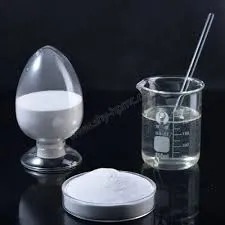
Dec . 05, 2024 06:11 Back to list
Is HPMC Soluble in Water and What Are Its Properties
Is HPMC Soluble in Water? An Overview
Hydroxypropyl methylcellulose (HPMC) is a widely used cellulose derivative in various industries, including pharmaceuticals, food, and construction. One of the most important characteristics of HPMC is its solubility in water, which plays a crucial role in its applications. This article explores the solubility of HPMC in water, its implications, and a few practical applications in different sectors.
Understanding HPMC
HPMC is synthesized by modifying cellulose, a natural polymer derived from plant sources. The modification process introduces hydroxypropyl and methoxy groups into the cellulose molecular structure. This modification alters the physical and chemical properties of cellulose, enhancing its functionality in various applications.
Solubility of HPMC in Water
HPMC is known for its excellent solubility in water, which is a key factor in its utility. The solubility of HPMC can vary depending on its molecular weight and the degree of substitution of hydroxypropyl and methoxy groups. Generally, HPMC is soluble in cold or hot water, forming a smooth, viscous gel-like solution. This property allows HPMC to act effectively as a thickener, binder, emulsifier, and stabilizer in many formulations.
Factors Affecting Solubility
Several factors influence the solubility of HPMC in water
1. Molecular Weight HPMC comes in various grades with different molecular weights, ranging from low to high. Lower molecular weight HPMC tends to dissolve more readily in water than higher molecular weight variants.
is hpmc soluble in water

2. Degree of Substitution The degree of substitution (DS) refers to the number of hydroxyl groups replaced by methoxy or hydroxypropyl groups. A higher degree of substitution usually results in increased hydrophilicity, enhancing solubility in water.
3. Temperature and pH The solubility of HPMC is also temperature-dependent, with higher temperatures generally facilitating better solubility. pH can affect the ionization of functional groups in HPMC, impacting its solubility.
Applications of Water-Soluble HPMC
The water solubility of HPMC allows it to be utilized in various industries
- Pharmaceuticals In the pharmaceutical industry, HPMC is commonly used as a film-forming agent, drug delivery system, and as a binder in tablet formulations. Its ability to dissolve in water makes it suitable for creating gels and sustained-release formulations.
- Food Industry In food applications, HPMC is often used as a thickening agent, stabilizer, and emulsifier. Its solubility in water allows it to be incorporated easily into sauces, dressings, and baked goods, enhancing texture and stability.
- Construction HPMC is also employed in the construction industry, particularly in cement and mortar formulations. Its water retention properties help improve workability and adhesion, making it a valuable additive in construction materials.
Conclusion
In summary, Hydroxypropyl methylcellulose (HPMC) is indeed soluble in water, which is fundamental to its functionality across various industries. The solubility of HPMC, influenced by factors like molecular weight, degree of substitution, temperature, and pH, allows it to serve diverse purposes, from pharmaceuticals to food and construction applications. Its versatile nature and beneficial properties make HPMC an essential component in many formulations, reflecting the importance of understanding its solubility and the conditions that affect it. As industries continue to evolve, the demand for water-soluble polymers like HPMC is likely to grow, driven by their ability to enhance product performance and effectiveness.
-
Versatile Hpmc Uses in Different Industries
NewsJun.19,2025
-
Redispersible Powder's Role in Enhancing Durability of Construction Products
NewsJun.19,2025
-
Hydroxyethyl Cellulose Applications Driving Green Industrial Processes
NewsJun.19,2025
-
Exploring Different Redispersible Polymer Powder
NewsJun.19,2025
-
Choosing the Right Mortar Bonding Agent
NewsJun.19,2025
-
Applications and Significance of China Hpmc in Modern Industries
NewsJun.19,2025







